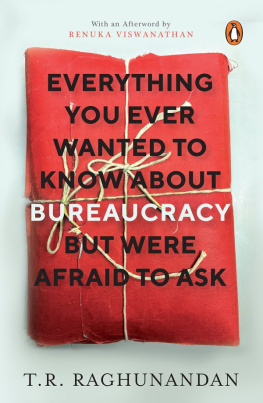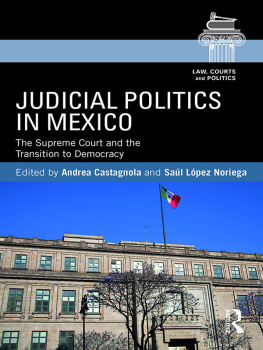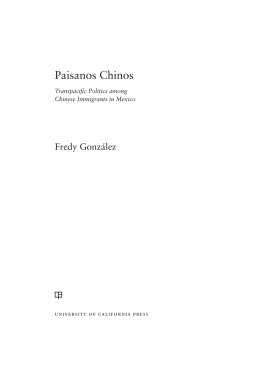To Bertha Alicia (You say yes...)
To my parents, brothers and sister
Last, but not least, to my dear grandmother
First published 1999 by Ashgate Publishing
Reissued 2018 by Routledge
2 Park Square, Milton Park, Abingdon, Oxon OX14 4RN
711 Third Avenue, New York, NY 10017, USA
Routledge is an imprint of the Taylor & Francis Group, an informa business
Copyright Eduardo Torres Espinosa 1999
All rights reserved. No part of this book may be reprinted or reproduced or utilised in any form or by any electronic, mechanical, or other means, now known or hereafter invented, including photocopying and recording, or in any information storage or retrieval system, without permission in writing from the publishers.
Notice:
Product or corporate names may be trademarks or registered trademarks, and are used only for identification and explanation without intent to infringe.
Publishers Note
The publisher has gone to great lengths to ensure the quality of this reprint but points out that some imperfections in the original copies may be apparent.
Disclaimer
The publisher has made every effort to trace copyright holders and welcomes correspondence from those they have been unable to contact.
A Library of Congress record exists under LC control number: 99076347
ISBN 13: 978-1-138-61145-0 (hbk)
ISBN 13: 978-0-429-45940-5 (ebk)
In exploring Mexican politics, scholars normally focus on either the presidency or group politics. Little attention is still paid to the institutional and bureaucratic settings within which broader political and economic processes take place. This book contributes to filling the gap by examining the relationship between central bureaucracy and politics in contemporary Mexico. In doing so, it focuses on the life-cycle of one ministry, the Secretara de Programacin y Presupuesto (SPP). Both the theoretical approach and the analytical framework used is provided by recent theories of politics that stress the role of institutions and rules in political life and decision-making.
One key question the book attempts to answer is: Why did the SPP become the most influential ministry in Mexican history? The main hypothesis inspected argues that, together with contextual factors, it was the result of its concentrating strategic institutional resources in a highly centralized and bureaucratized non-democratic context. What will be interesting is to see why the presidential regime first encouraged and fifteen years later ended this unprecedented resource concentration. Equally relevant will be to see the manner in which this phenomenon altered the existing institutional and political arrangements of the Mexican state.
As the book will argue, until the early 1970s, there was a dual, historically-grounded, policy-network system which reflected a clear-cut separation between economic and political management. It is contended that the emergence and operation of the SPP contributed to the deterioration of this institutional arrangement, thus blurring the already tenuous line between the bureaucratic and political realms. Furthermore, the adoption of national planning, amid a context of growing political centralization, would enhance not only the policy role of the highly-trained bureaucrat, but also the role of the SPP as the most effective path to high office.
Throughout its relatively short existence, as a result, this ministry would produce not only an impressive number of ministers, governors and legislators, but also three presidents in a row. It should not be forgotten that current president Zedillo was the SPPs last head. Never before had a single Mexican agency different from the ruling party helped so many individuals to make progress in their careers. Because of this fact alone, many relevant events that have occurred in Mexico since 1977 cannot be dissociated from the acronym SPP. This is illustrated by this ministrys part in consolidating state intervention during the 1978-1981 oil boom, and in tackling the economic crisis that followed. More significantly, the SPP would play a relevant role in directing the countrys shift to a market-orientated system especially after 1986.
Excluding external factors, it could be contended that presidents De la Madrid and Salinas similar perceptions, values and ideological orientations, together with the overwhelming power of the Mexican presidency, explains policy shift as well as policy continuation. This superficial view, however, leaves unanswered many important questions. Why did the SPP serve as a platform for the presidency in the first place? How, and why, did it happen that so many influential policy makers had operated within the SPP or had been a product of it? Why did a statist agency par excellence become a privatist agency?
There are three main conclusions to the book. First, institutional reorganization in Mexico is far from being cosmetic, for it reflects broader political and economic processes. Second, the SPP becoming an influential political actor as well as a relevant agent of elite change and economic transformation shows that, under certain circumstances, Mexican ministries can enjoy a considerable degree of autonomy. Third, the lack of a dividing line between the administration and politics had relevant implications in both goal displacement and exercise of power at the margin of the existing electoral system. In Mexico, the lack of this line is at odds with a definitive transition towards more democratic practices.
On the whole, the book suggests that the systematic study of the Mexican bureaucracy and its components, still in an embryonic stage, can shed enormous light on the operation of the political system and its prospects for change.
This book was not a personal enterprise. Both people and institutions contributed to make it possible. Because there are many to thank, the author apologizes for not mentioning all of them in an explicit way. In any event, they should not be held responsible for the views, methodological limitations and errors contained in these pages. As usual, the author accepts full responsibility for them.
First of all, I owe a heavy debt of appreciation to Dr George Philip (LSE). His diligent reading of every draft and every redraft, and his punctual comments - some praising, most of them critical - proved essential to the construction of this book. Professor George Jones (LSE), Dr Ann Varley (University College London), Professor Peter Calvert (Southampton) and Dr Len Cortinas Pelaez (UAM-UNAM) provided detailed and intelligent comments on the whole work, which provoked important revisions.
The long list of colleagues and friends, who contributed to the book with valuable comments, includes: Professor Stephen Wilks (Exeter), Adrian Lobsiger (UN), Dr Arnaldo Crdova (UNAM), Dr Rogelio Hernndez (El Colegio de Mxico), Rubn Islas Ramos (UNAM-Acatln), Rodolfo Vergara (UAM), Hctor Santana (LSE), Dr Alejandro Rodrguez (Universidad Iberoamericana), Luis Antonio Ramrez (ITAM), Dr Cesar Nava-Escudero (UNAM), Fernando Pinera Snchez, Dr Gabriel Corona (UNAM-Acatln), Dr Esperanza Duran, Dr Rodolfo Haro Garca (IPN), Osvaldo Santin, Ernesto Piedras (ITAM), Alberto Peredo (LSE), Juan Osorio, Jorge Leal, Armando Jimnez (LSE), Jos Adolfo Murat, Michael Bostock, Georgos Geordas, Marco Antonio Garza, Gaye Black and Tim Smith.
A number of institutions were particularly helpful in carrying out this book. The author is indebted to the London School of Economics and Political Science and its Methodology Institute. (Here, I wish to thank two of my teachers: Dr Colm OMuircheartaigh and Professor Patrick Dunleavy. They cannot imagine how much I learnt from them.) The same goes to the numerous Mexican and British libraries, including their librarians, which I visited over the years. Nice memories come from the British Library of Political and Economic Science, the Institute of Latin American Studies, Senate House and the British Museum.







